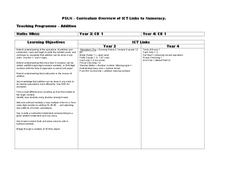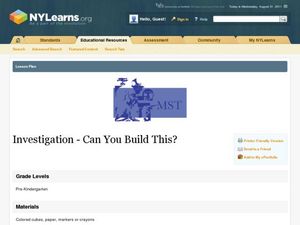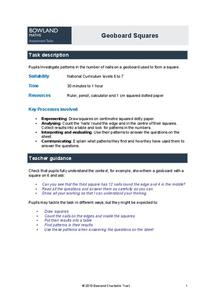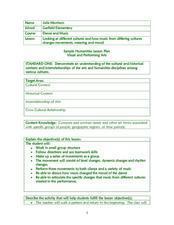Curated OER
Missing Numbers to Twenty
Which number is missing? Beginning counters examine twenty-six number sequences, one for each letter of the alphabet. Each sequence has four numbers, ranging from one to 20. There is one number missing from the sequence, and learners...
Polk Bros Foundation
Preview Reading
Scanning a text before getting started is a reading strategy that your pupils can use to get a general idea about a text before diving in. Give some direction to their scanning with a worksheet that includes items to check for and space...
Curated OER
Counting by 3s, 4s, and 5s
Skip count along the mushrooms to complete these number sentences which give young scholars an introductory look at addition and subtraction. Starting from five double-digit numbers, they subtract or add by threes, fours, and fives to...
Curated OER
The ai Sound
There are multiple vowels that make the /ai/ sound within words; show your learners three of them in this spelling worksheet. They look at some examples, then complete three sets of words by adding in the vowels to make this sound. The...
Curated OER
Find the Rhyme
Which one rhymes? There are four starting objects here, each heading a row of three objects. Learners identify the objects and their vowel sounds to determine which one rhymes with the first object. All these rhyming words involve the...
Curated OER
Curriculum Links To Numeracy
Youngsters practice looking for the links to numeracy in their classes. This isn't a worksheet but a curriculum guide for an entire unit. Teachers can use any part of the resource to extend or inform their teaching practices related to...
Curated OER
Investigation--Can You Build This?
Early learners explore shapes using colored blocks. They first get some hands-on time with the blocks and then look at beginning math concepts regarding spatial relationships. They work with a partner to build a 6-8 block tower with...
Curated OER
Counting Out Loud
These number sequences are quite fun to look at! Beginning counters complete six of them as they say and write in the numbers. They count only by 1s, however some of these move from greatest to least. The highest number here is 20. Once...
CK-12 Foundation
Two-Sided Stem-and-Lead Plots: Gamers
Which gender spends more time playing video games? Your classes use provided data to answer this question. They first build a two-sided stem-and-leaf plot and then use the display to look for patterns. Guiding questions help them...
Curated OER
Design Patterns in Everyday Life
Students find symbols and patterns in everyday life. In this patterns lesson, students break into groups and look for specific patterns and symbols. Students record their findings. Students create a graphic organizer with the information.
Curated OER
The Three Pigs
Second graders design and construct homes for the three pigs. Each of the homes is made and filled with patterns that we explore. They continue a sequential pattern and describe a rule for this.
Curated OER
Rep Tiles
Third graders use pattern blocks of one shape at a time to try to create a similar shape. They compare the perimeter of the new figure with the perimeter of the original shape and look for a pattern. Students use the pattern to predict...
Curated OER
Fish Tank Territories
Students observe swimming and resting patterns of aquarium fish to determine how different parts of the habitat are used. Different pairs of students should compare their results after several days to look for daily patterns.
State of Michigan
Pre-K Mathematics
Kick-start children's education with this pre-school math unit. Offering 31 different hands-on learning activities that develop young mathematicians' pattern and shape recognition, basic number sense, and much more, this is a must-have...
Curated OER
Create and Analyze Rectangular Patterns
Students explore the concept of geometric patterns. In this geometric pattern lesson, students use Microsoft Excel to explore geometric patterns. Students analyze growth rates of pattern growth. Students create their own patterns and...
Illustrative Mathematics
Seven to the What?!?
Sometimes what seems like the easiest problem is really the most difficult. Your class is first going to reach for their calculators, but will realize the number is too large to evaluate. Now what? This is where the fun and the logical...
Bowland
Geoboard Squares
Don't be a square! Help your budding mathematicians discover patterns within squares. Scholars create squares on geoboards and identify patterns in the number of nails, both nails on the edge of the squares and nails within the squares....
EngageNY
Relationships Between Two Numerical Variables
Is there another way to view whether the data is linear or not? Class members work alone and in pairs to create scatter plots in order to determine whether there is a linear pattern or not. The exit ticket provides a quick way to...
Mathematics Assessment Project
Floor Pattern
You'll never look at floor tiles the same again. An assessment task prompts learners to investigate relationships between patterns involving squares and kites to determine angle measurements. They then prove whether a given quadrilateral...
Curated OER
Odd One Out
Which of these wacky shapes is different? Learners examine five rows of figures, each with a starting shape at the beginning. They determine which of the four following shapes looks different from the first, circling it. Consider having...
Curated OER
Looking at different cultures and how music from differing cultures changes movements, meaning and mood
Each of the three dance lessons included here will get your class moving. The first lesson allows learners to explore how music and movement differ in meaning depending on cultural context. Lesson two gives them an opportunity to create...
It's About Time
Atoms with More Than One Electron
Provide young chemists with the ability to manipulate atoms and predict their results, in this sixth lesson. Pupils analyze energy patterns as they predict the amount of energy required to remove electrons from atoms. They compare trends...
Curated OER
Bugs Take Shape
Students investigate butterflies, moths, ladybugs and spiders looking at shapes, colors and patterns. They create a three dimensional bug using Crayola Model Magic, repeating patterns found in nature. They cut and shape the dough using...
DK Publishing
Learning 9 - Write the Number
As novice counters learn numbers 0-10, use this exercise to focus on the number nine. They begin by tracing and printing the numeral several times. Next, learners count sets of stars and record the totals, all of which are nine....

























